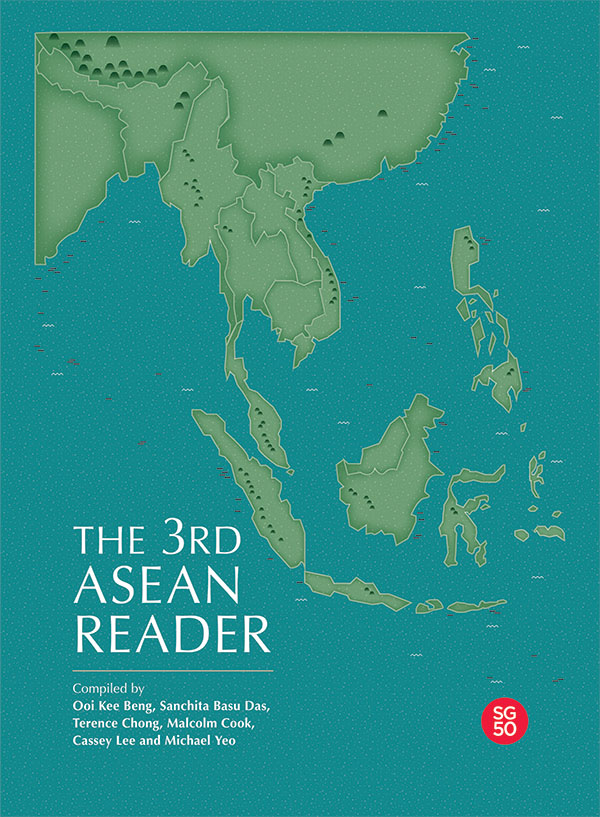Book contents
- Frontmatter
- Contents
- Preface
- Forewords to the First and Second ASEAN Reader: ASEAN: Conception and Evolution
- Forewords to the First and Second ASEAN Reader: ASEAN: The Way Ahead
- Forewords to the First and Second ASEAN Reader: New Challenges for ASEAN
- SECTION I ASEAN: THE LONG VIEW
- SECTION II COUNTRY ANALYSES
- SECTION III COMPARATIVE ANALYSES OF THE REGION
- Southeast Asian Societies
- The Southeast Asian Economy
- Southeast Asian Politics
- SECTION IV INTERNATIONAL DEVELOPMENTS
- SECTION V INSTITUTIONS OF ASEAN
- SECTION VI ASSESSING ASEAN'S INTERNAL POLICIES
- ASEAN Political Security Community
- ASEAN Economic Community
- ASEAN Socio-Cultural Community
- SECTION VII ASSESSING ASEAN'S EXTERNAL INITIATIVES
- ASEAN Processes
- ASEAN's Major Power Relations
- 71 ASEAN's Adventures
- 72 Developing an Enduring Strategy for ASEAN
- 73 Non-Traditional Security in China-ASEAN Cooperation: The Institutionalization of Regional Security Cooperation and the Evolution of East Asian Regionalism
- 74 China-ASEAN FTA Changes ASEAN's Perspective on China
- 75 Japan's Trade Policy with Asia
- 76 Managing Integration in East Asia: Behind Border Issues in Japan-ASEAN Trade Agreements
- 77 Fortifying the Japan-ASEAN Strategic Partnership: Abe's Quest for Viable Hedging Policies
- 78 Prospects for Korean-Southeast Asian Relations
- 79 China's Two Silk Roads: Implications for Southeast Asia
- SECTION VIII SOUTHEAST ASIA: PERIPHERAL NO MORE
- Bibliography
- The Contributors
- The Compilers
78 - Prospects for Korean-Southeast Asian Relations
from ASEAN's Major Power Relations
Published online by Cambridge University Press: 22 June 2017
- Frontmatter
- Contents
- Preface
- Forewords to the First and Second ASEAN Reader: ASEAN: Conception and Evolution
- Forewords to the First and Second ASEAN Reader: ASEAN: The Way Ahead
- Forewords to the First and Second ASEAN Reader: New Challenges for ASEAN
- SECTION I ASEAN: THE LONG VIEW
- SECTION II COUNTRY ANALYSES
- SECTION III COMPARATIVE ANALYSES OF THE REGION
- Southeast Asian Societies
- The Southeast Asian Economy
- Southeast Asian Politics
- SECTION IV INTERNATIONAL DEVELOPMENTS
- SECTION V INSTITUTIONS OF ASEAN
- SECTION VI ASSESSING ASEAN'S INTERNAL POLICIES
- ASEAN Political Security Community
- ASEAN Economic Community
- ASEAN Socio-Cultural Community
- SECTION VII ASSESSING ASEAN'S EXTERNAL INITIATIVES
- ASEAN Processes
- ASEAN's Major Power Relations
- 71 ASEAN's Adventures
- 72 Developing an Enduring Strategy for ASEAN
- 73 Non-Traditional Security in China-ASEAN Cooperation: The Institutionalization of Regional Security Cooperation and the Evolution of East Asian Regionalism
- 74 China-ASEAN FTA Changes ASEAN's Perspective on China
- 75 Japan's Trade Policy with Asia
- 76 Managing Integration in East Asia: Behind Border Issues in Japan-ASEAN Trade Agreements
- 77 Fortifying the Japan-ASEAN Strategic Partnership: Abe's Quest for Viable Hedging Policies
- 78 Prospects for Korean-Southeast Asian Relations
- 79 China's Two Silk Roads: Implications for Southeast Asia
- SECTION VIII SOUTHEAST ASIA: PERIPHERAL NO MORE
- Bibliography
- The Contributors
- The Compilers
Summary
The Republic of Korea is passing through three “years of Southeast Asia”, starting in 2008. A variety of anniversaries, summits and initiatives are scattered across these years. Korea and Thailand celebrated fifty years of diplomatic ties in 2008. The following year brought the sixtieth anniversary of Philippine-Korean relations and the twenty-fifth anniversary of ties between Brunei and Korea. Malaysia and Korea will in 2010 commemorate the establishment of diplomatic relations fifty years ago. In late 2008, the ASEAN countries and Korea signed a memorandum of understanding to establish in Seoul an ASEAN-Korea Centre to facilitate socio-cultural and economic interaction between those countries and Korea. The centre began operation in early 2009.
ASEAN and the Republic of Korea celebrated two decades as dialogue partners in 2009. To mark this milestone, an ASEAN-Korea Commemorative Summit was held on Jeju Island in June. The national leaders of Southeast Asia and the Republic of Korea met again only four months later at the ASEAN+3 Summit in Thailand in October 2009. Korean president Lee Myung-Bak announced a “New Asia Initiative” (NAI) in March 2009, during a trip to Indonesia. Southeast Asia is one of the central foci of the NAI. It epitomized the way in which the events, anniversaries and initiatives of the 2008–10 period augur well for future relations between Southeast Asia and Korea.
Although not widely appreciated among members of the general public in Korea and Southeast Asia, practical contacts and exchanges between the two surpass what is easily imaginable. Southeast Asian countries and the Republic of Korea have cooperated closely in the political-security field. Southeast Asian countries, individually and collectively through ASEAN, have supported the Republic of Korea's position in efforts to address problems on the Korean peninsula. In return, Korea has not spared its support for ASEAN integration.
Since the beginning of ASEAN+3 regional cooperation, space for cooperation between Southeast Asia and Korea to shape the newly emerging regional order has grown. Both Southeast Asia and Korea share similar strategic interests in a region where two great powers, China and Japan, compete for hegemony. Solid cooperation among middle powers such as the Southeast Asian countries and Korea can mediate, veto and lead the great powers, shaping a regional order rooted in principles of equality.
- Type
- Chapter
- Information
- The 3rd ASEAN Reader , pp. 401 - 403Publisher: ISEAS–Yusof Ishak InstitutePrint publication year: 2015

